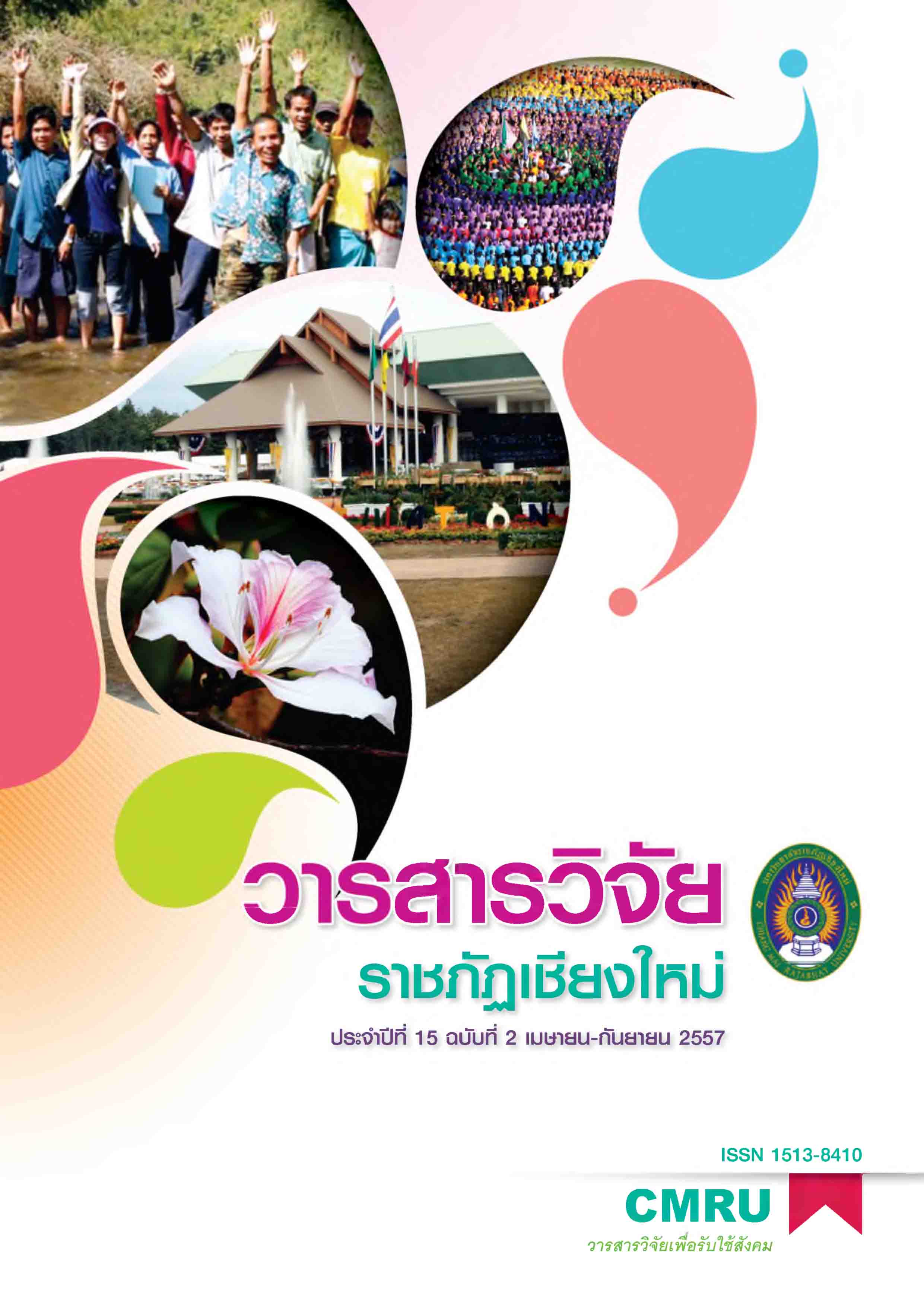กลยุทธ์แห่งความสำเร็จในการบริหารจัดการภาครัฐของไทย
DOI:
https://doi.org/10.14456/rcmrj.2014.96186Keywords:
รางวัลคุณภาพการบริหารจัดการภาครัฐ, จัดการเชิงกลยุทธ์, ปัจจัยสู่ความสำเร็จ, Public Sector Management Quality Award, PMQA, strategic Management, Success FactorAbstract
การวิจัยครั้งนี้มีวัตถุประสงค์เพื่อ 1) ศึกษากระบวนการจัดการเชิงกลยุทธ์ของหน่วยงานที่ได้รับรางวัลการบริหารจัดการภาครัฐรายหมวด ประจำปี พ.ศ.2556 และ พ.ศ.2556 2) ปัจจัยที่ส่งผลต่อความสำเร็จในการพัฒนาคุณภาพการบริหารจัดการภาครัฐรายหมวด และ 3) แนวทางการพัฒนาการบริหารจัดการเพื่อกำหนดรูปแบบการบริหารจัดการภาครัฐสู่องค์การแห่งความเป็นเลิศครบทุกด้าน ข้อมูลที่ใช้ในการศึกษา ได้แก่ การศึกษาจากเอกสาร (Documentary study) และการวิจัยภาคสนาม (Field Research) โดยเก็บจากผู้บริหารระดับสูง และคณะทำงานพัฒนาคุณภาพการบริหารจัดการภาครัฐของหน่วยงานที่ได้รับรางวัลคุณภาพการบริหารจัดการภาครัฐรายหมวด ประจำปี พ.ศ.2555 และ พ.ศ.2556 จำนวน 10 หน่วยงาน
ผลการวิจัย พบว่า กระบวนการจัดการเชิงกลยุทธ์ของหน่วยงานที่ได้รับรางวัลการบริหารจัดการภาครัฐรายหมวดประจำปี พ.ศ.2555 และ พ.ศ.2556 ทั้ง 10 หน่วยงาน มีรูปแบบที่คล้ายคลึงกัน โดยเริ่มจากการวิเคราะห์สภาพแวดล้อมภายใน ภายนอก เพื่อนำมาเป็นข้อมูลกำหนดเปัาประสงค์และกลยุทธ์การดำเนินการ การนำกลยุทธ์มาปฏิบัติมีการสื่อสารและปรับทัศนคติของบุคลากรให้เปิดใจรับความเปลี่ยนแปลง การให้ทุกฝ่าย ทุกระดับเข้ามามีส่วนร่วมในการสร้างคุณภาพโดยเน้นการตรวจสอบ ประเมินหาข้อบกพร่องและนำมาปรับปรุงแก้ไขอย่างต่อเนื่อง เพื่อนำไปสู่ความสำเร็จตามเป้าหมายของแต่ละหน่วยงาน ปัจจัยที่ส่งผลต่อความสำเร็จในการพัฒนาคุณภาพการบริหารจัดการภาครัฐรายหมวด พบว่า ปัจจัยหลักที่ส่งผล ได้แก่ ปัจจัยด้านผู้นำและปัจจัยการบริหาร กล่าวคือ ผู้นำหน่วยงานทุกระดับให้การยอมรับและเล็งเห็นความสำคัญของการปรับปรุงเปลี่ยนแปลง พร้อมให้การส่งเสริมสนับสนุน ผลักดันให้มีการพัฒนาคุณภาพงาน โดยมีการส่งเสริมให้การนำหลักการจัดการภาครัฐแนวใหม่มาใช้ในการพัฒนาคุณภาพงาน โดยเน้นการจัดการเชิงกลยุทธ์ (Strategic Management)การบริหารคุณภาพทั่วทั้งองค์การ (Total Quality Management: TQM) โดยให้ทุกคนมีส่วนร่วม โดยเน้นที่ความพึงพอใจของลูกค้า มีการปรับปรุงแก้ไขตามวงจรเดมมิ่ง (PDCA) เพื่อมุ่งไปสู่ความเป็นเลิศ เน้นการมีธรรมาภิบาล (Good Governance)การทำงานเป็นทีม การบริหารแบบมุ่งผลลัมถุทธิ์ (Result Based Management: RBM) การประเมินผลการปฏิบัติงานองค์การแบบสมดุล (Balanced Scorecard) การสร้างขวัญและแรงจูงใจในการทำงานเพื่อนำไปสู่วิธีปฏิบัติที่เป็นเลิศ (Best Practices) และสร้างนวัตกรรม มาใช้ในการพัฒนาคุณภาพงานอย่างสม่ำเสมอ หลักและวิธีการบริหารดังกล่าวจึงถือ เป็นแนวทางการพัฒนาการบริหารจัดการเพื่อกำหนดรูปแบบการพัฒนาองค์การเพื่อนำไปสู่องค์การแห่งความเป็นเลิศครบทุกด้าน
STRATEGY FOR SUCCESS IN THE MANAGEMENT OF THAI PUBLIC SECTOR
The objectives of this research were to examine 1) strategic management processes of state agencies receiving the public sector management awards in the section category in 2012-2013; 2) factors affecting the success in improving the management quality of those agencies; and 3) a development guideline to establish management models for the public sector to become an organization of best practices. The data for analysis were collected from both documentary study and field research from executives and committee members working for the improvement of the management quality in the ten state agencies receiving the awards.
The research findings revealed that the strategic management processes of the ten state agencies were similar. They included analyzing internal and external environments in order to use the data to determine the goals and operational strategies, implementing the strategies, communicating with and adjusting attitudes of personnel to open up for change, and encouraging everyone to participate in establishing work quality with a focus on examining and assessing weaknesses in order to regularly improve their performances, so that the goals of the agencies could be achieved. The main factors affecting the success in improving the management quality were leadership and effective management. This means that leaders of all levels accepted changes and were well aware of the importance of improvement. Furthermore, they encouraged and pushed for the quality of job performances by integrating new principles of public management with an emphasis on strategic management, total quality management, customers’ satisfaction, the PDCA cycle, good governance, teamwork, result-oriented management, balance scorecard, morale and incentive boosting, best practices, and creation of innovations to improve job quality. These management principles and practices are regarded as guidelines of management development that will define an organization of best practices.
Downloads
Downloads
How to Cite
Issue
Section
License
1. Articles, information, content, images, etc published in the “Community and Social Development Journal” are copyrighted by the Community and Social Development Journal, Chiang Mai Rajabhat University. In order to properly distribute the articles through print and electronic media, the authors still hold the copyright for the published articles under the Creative Commons Attribution (CC BY) license, which allows the re-distribution of the articles in other sources. References must be made to the articles in the journal. The authors are responsible for requesting permission to reproduce copyrighted content from other sources.
2. The content of the articles appearing in the journal is the direct responsibility of the article authors. The editorial board of the journal does not necessarily agree with or share any responsibility.














